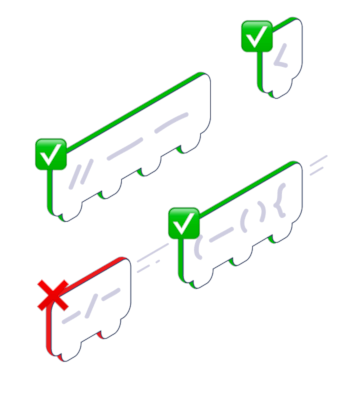9 releases (breaking)
| 0.7.1 | May 19, 2024 |
|---|---|
| 0.7.0 | Mar 20, 2022 |
| 0.6.0 | Oct 15, 2021 |
| 0.5.0 | Oct 14, 2021 |
| 0.1.1 | Sep 30, 2021 |
#2052 in Network programming
Used in keyscope
85KB
2K
SLoC

Service Policy Kit
service_policy_kit is a Rust based toolkit for verifying HTTP services against policies. You can:
- Build a complete testing framework on your own, with
service_policy_kittaking care of all the expectation logic - Run fuzzing tests against your services
- Integrate in your code to perform custom readiness/self checks
- Build your own tools (CLIs) that perform service validation and security testing of different kinds
Quick Start
Add to Cargo.toml
service_policy_kit = "0.2.0"
Example
Here's a full-blown policy runner that you can reuse:
use serde_yaml;
use service_policy_kit::data::{Context, SequenceInteractions};
use service_policy_kit::runner::{RunOptions, SequenceRunner};
use std::process::exit;
fn main() {
let opts = RunOptions::default();
let runner = SequenceRunner::from_opts(&opts);
let sequence: SequenceInteractions = serde_yaml::from_str(
r#"
http_interactions:
- request:
id: step one
uri: http://example.com
response:
status_code: "200"
"#,
)
.unwrap();
let mut context = Context::new();
let res = runner.run(&mut context, &sequence.http_interactions);
exit(if res.ok { 0 } else { 1 })
}
You can run it by cloning this repo, and then:
cargo run --example quick-start
You should get:
$ cargo run --examples quick-start
✔ step one: ok 288ms
Ran 1 interactions with 1 checks in 288ms
Success: 1
Failure: 0
Error: 0
Skipped: 0
Capabilities
- ✅ Flexible design: Use the runner for any purpose, sequence or individual interactions
- ✅ Contextual flows: interactions can extract, define and pass variables to the next ones
- ✅ Out of the box reporters: saves you some boilerplate work Multiple checks included: content, benchmark, certificates
- ✅ Discovery (WIP): given recorded API interactions, or an API spec, automatically generate interactions.
Concepts
There are a few concepts that make up service_policy_kit: Interaction, Expectation, Check, Violation and Runners.
Interaction
An interaction is a definition of calling an external service, and the expected responses per check type.
Interaction {
request,
response,
examples,
benchmark,
cert,
}
Expectation (Policy)
An expectation is a set of expected matchers for all of the parts that are extracted from an interaction response.
Each of the fields take regular expressions and are matched against a live response accordingly.
Response {
headers,
status_code,
body,
vars,
}
Check
A check is an abstract action over a response. For example, running content expectation, a benchmark, or any other policy against a service.
Violation
Any check can output violation. A successful check has no violations.
Runners
A runner takes a set of interactions and execute these. For example, the included SequenceRunner will always execute interactions in a sequence, extracting variables from one interaction and passing it to the next one via Context.
Thanks
To all Contributors - you make this happen, thanks!
Copyright
Copyright (c) 2021 @jondot. See LICENSE for further details.
Dependencies
~22–38MB
~634K SLoC